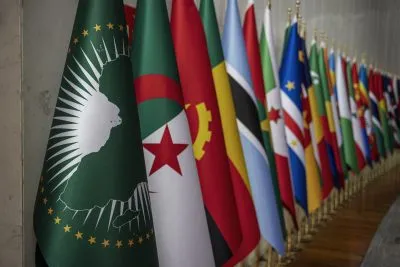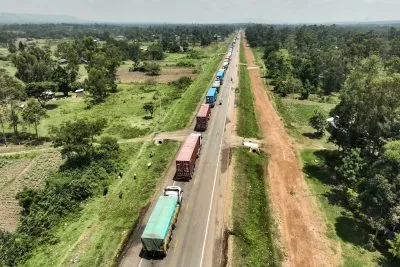Dr Adesola Adeduntan is the CEO of FirstBank Group, the commercial banking arm of FBN Holdings Plc, which comprises First Bank of Nigeria and subsidiaries including FBNBank UK, FBNBank DRC, FBNBank Ghana, FBNBank Senegal, FBNBank Guinea, FBNBank Gambia, FBNBank Sierra Leone and First Pension Custodian as well as representative offices in France and China.
He is overseeing one of the most extensive transformation programmes in the sub-Saharan African financial services industry through the development and execution of a digital-led strategy that has established FirstBank as the dominant player in digital banking.
FirstBank Group’s transformation programme, under Adesola’s leadership, has enabled the Bank to grow customer accounts from about 10m in 2015 to over 36m and become the second largest issuer of cards in Africa with over 11.8m issued cards.
His three-decade career in banking has led to a roomful of awards and recognition including an Honorary Doctor of Science by Cranfield University, UK, and the African Banker of the Year Award.
He holds an MBA from Cranfield University Business School, UK, and a Doctor of Veterinary Medicine (DVM) awarded by the University of Ibadan. A noted philanthropist, he loves music, especially African folk music.
The Central Bank of Nigeria (CBN) has consistently assured bank customers and investors that Nigeria’s financial system is strong and resilient. Do you agree with this assessment? If yes, what factors have contributed to the industry’s strength in the face of headwinds?
Technology and digital capabilities have allowed the financial services industry players to tap into new markets, improve processes and maximise existing businesses in the face of those headwinds.
As one of the Systemically Important Banks, with a large customer base and balance sheet size, how has FirstBank managed to retain its customers despite fierce competition?
FirstBank remains one of the dominant banks in the Nigerian banking sector, with a large customer base – over 37m customer accounts – and a balance sheet size 0f over N8.8trn [$21bn].
The Bank leverages technologies and digital capabilities to stay ahead of the competition, continuously delivering differentiated products that attend to customers’ needs/pain-points and quality services that deliver exceptional experience to customers. At FirstBank, the customer is at the heart of all our business decisions and actions. This is in line with our ‘Customer First’ mantra.
FirstBank remains committed to delivering exceptional experience and services to customers whilst driving growth and retention of its customer base in the face of fierce competition. FirstBank also leverages innovation to distinguish itself in the marketplace.
Your bank is one of the top lenders that enjoyed regulatory backing in the form of forbearance. How has it been able to leverage on that support to improve its profitability and leadership position in the industry?
Forbearance is a global regulatory tool used by banking regulators to manage and stabilise the industry in the face of macroeconomic shocks.
Like every other bank, the support from the banking regulator in the form of forbearance has helped FirstBank to limit the adverse impacts of macro shocks on its profitability and industry leadership position.
It should be noted that FirstBank has strong underlying business fundamentals even without the regulatory forbearance. As such, the support from the regulator complements the existing fundamentals.
FirstBank posted over N170bn [$407m] gross earnings in Q1, 2022. The bank’s total assets stood at N8.8trn [$21bn] while Profit After Tax stood at N31bn [$74m], among other positive indicators. What are the key areas that contributed to this profitability?
The bank continues to seek out innovative ways that will positively impact the revenue-generating capabilities of its business.
The Q1 2022 revenue performance of the Bank is driven largely by: an increase in risk asset growth that propelled interest income and other credit related fees; improved transaction momentum leading to impressive fees and commission revenue performance, and optimised treasury and trading activities that drove trading revenue performance.
Is there room for further performance improvement?
Yes, we believe that there is room for further performance improvement.
In line with the Bank’s 2020-2024 strategic ambition of delivering accelerated growth in profitability through customer-led innovation and disciplined execution, the Bank will continue to focus on delivering significant value to shareholders and customers through the identification of new opportunities, improving efficiency and optimising existing business opportunities.
The e-payment system is gaining widespread acceptance among the youth, especially the millennials. What is your bank doing to capture the youthful market and reap the benefits that come with it?
In line with FirstBank’s ‘YouFirst’ mantra, we put our customers at the heart of every business decision and action in the Bank.
FirstBank remains an institution at the forefront of innovation in the industry and its Digital Lab enables the Bank to continue its rapid innovation and deployment of innovative products particularly tailored to the youth segment. The Bank has specific products that are tailored to meet the everyday needs of the digitally savvy youth population.
One such product is the Bank’s LIT App – a digital marketplace offering a bouquet of financial and non-financial services in an innovative way.
Additionally, the Bank has a youthful workforce with an about 60% millennia population. This predominantly youthful workforce helps the Bank to better interpret the requirements and needs of the youthful market as well as better connect with them.
With increased use of digital banking, comes the danger of rising cases of e-fraud. What steps is FirstBank taking to promote banking security and the confidence of its customers on its digital banking channels?
The Bank is also implementing a behavioural monitoring solution to track and stop/hold transactions that are out-of-pattern.
What are your thoughts on the eNaira and its level of acceptance since it was launched last October? What, if anything, is your bank doing to improve usage of the CBN Digital Currency?
The Central Bank of Nigeria (CBN) as the regulator of the banking industry, continues to lead and drive development in the industry. In the banking industry, digital currency is the future and the CBN is staying ahead of the curve in Africa with the introduction of the eNaira, given the several benefits associated with the digital currency, such as safety, speed, and convenience.
A review of events over the course of the past few years has shown that digitalisation in its different forms has been net positive for the financial services industry. The eNaira is no different, the digitisation of the naira expands upon Nigeria’s already advanced payment ecosystem; the roadmap for the eNaira over the next couple of months will reveal some exciting use cases that will further grow the ecosystem and encourage even more interaction with this new form of currency.
Currently we have a whole segment of customers who have started using the eNaira and as the eNaira ecosystem grows and acceptance increases as a store of value and means of exchange, so will those numbers.
FirstBank’s channels currently account for about 17% of the total reported eNaira transaction volume. The Bank is dynamic and continues to be at the vanguard of innovation in the banking industry.
The forex market has been facing liquidity challenges leading to currency controls and forex restrictions on 43 items. What do you think should be the way out of this crisis?
To improve the current forex liquidity challenge in the country, there is a need to focus on strategies that can help the country earn more stable and sustainable inflows of foreign exchange.
In our opinion, the main approaches to respond to the forex liquidity crisis include: supporting the growth of the non-oil export sectors which have high transformative potential; adopting an import-substitution approach for key products to reduce importation, and creating incentives to attract more direct foreign investments in key sectors of the economy, including health and education.
The CBN has given banks more control in the supply of forex to retail end users, but there have been complaints that often access to forex from banks is not available. What is the case for your bank?
CBN has provided the required support by increasing forex allocation to all banks to facilitate the demands of retail end users, however the demand for forex has more than doubled. To ensure that we optimise CBN revised allocations, FirstBank typically engages the regulators, provides all the necessary foreign exchange bid documentations, and follows defined processes to ensure that our customers’ bids are successful.
For PTA and BTA requests, we have deployed an innovative approach, through the use of travel cards, that help to minimise or eliminate diversion of allocated foreign exchange.
The yields on government instruments like T-Bills and Bonds have dropped significantly in recent years. What is the impact on the banking sector profitability, given that banks are among the biggest investors in government securities?
In the past years, investment in government instruments was in high demand because of the attractive yields. However, in recent years, yields in government instruments have dropped due to the monetary policy direction that is aimed at boosting domestic credit and improving lending to critical sectors of the nation’s economy.
Given the low yields of government instruments, banks are now focusing on driving core lending activities to deliver improved revenue growth and mitigate the adverse impact of low yields from their investments in government instruments.
The implementation of the 65% Loan to Deposit Ratio CBN policy increased non-performing loans in banks. What worries do you have about the rising bad loans profile, given that it has always been at the centre of past bank crises?
MSMEs impact positively on the nation’s economy, specifically in terms of output of goods and services, as well as creating skilled workers, which are perceived as a basis for future industrial expansion.
It is true that high NPL levels in the banking industry have always been at the centre of past bank crises. However, given the risk management, technology and digital maturity levels of Nigerian banks, most banks have put in place several effective measures to reduce the incidence of non-performing loans in their portfolios.
Some banks (including FirstBank) are leveraging the power of data analytics and artificial intelligence to track financial credibility of obligors and monitor loans.
FirstBank has shown much commitment to financial inclusion through its Agency Banking Networks and reward scheme. How successful has this approach been?
Despite rising competition, FirstBank’s Agent Banking network is the undisputed leading bank-led network in Nigeria. FirstBank’s Firstmonie agent network operates in 772 of the 774 local government areas in Nigeria and has continued to increase by more than 76% year-on-year to more than 180,000 agents (including more than 55,000 female agents). The Firstmonie network has cumulatively processed more than N22.6trn [$54bn] and circa 1.02bn transactions on the network as at June 2022.
Over 50% of Firstmonie’s agents are in the rural areas, contributing significantly to improving the level of financial inclusion in such areas.
FirstBank’s Agent Banking network powers economic development in many communities throughout the country, creating more than 180,000 direct jobs and over 500,000 indirect jobs. Similarly, the scheme empowers agents financially through additional revenue from commissions and incentives. In 2021, FirstBank paid more than N20bn [$47m] to our agents and disbursed more than N130bn [$311m] agent credit facility to support their liquidity.
How do you see fintechs in Nigeria’s banking space? Are they providing healthy competition or crowding the market?
As we all know, innovation in the banking industry is no longer an optional capability for any financial institution, but a mandatory action required to remain relevant in the industry. In response to the threat posed by bigtechs and fintechs, banks are making significant investments in digital innovation.
Overall, I believe that fintechs are providing healthy competition to the incumbent banks as well as providing new opportunities for collaborations. These new collaboration opportunities are helping to deliver better industry offerings and improved customer experiences.
CSR plays an important role to show the world that companies can be conscious of the kind of impact they have on aspects of society. Can you tell us more about some of your initiatives to empower and give back to the community that you serve?
Our community development initiatives include the Infrastructure Development Programme; Endowment; Future First (a financial literacy, entrepreneurship and career programme); the E-Learning initiative; the SPARK (Start Performing Acts of Random Kindness) programme, as well as the Environment initiative. Let me highlight the impact we have made with regards to some of the initiatives.
So far, over 170,000 students and pupils have benefitted from the E-learning Initiative in partnership with IBM and Lagos State Government. The number includes 20,000 indigent students that have received free low-end devices preloaded with accredited content.
The FutureFirst programme in partnership with Junior Achievement has imparted knowledge of financial literacy and entrepreneurship to over 1m people across the regions of the country including Lagos, Port Harcourt and Abuja.
We partnered with Nigeria Conservation Foundation in the Green Recovery Nigeria (GRN) Initiative and in driving educational initiatives to raise awareness of environmental issues in Nigeria, and to encourage sustainable practices in over 30 schools across the country.
In 2021, the SPARK initiative positively impacted 80,000 people including widows, students and people living with disabilities. There have been 60 beneficiary schools and over 18,000 secondary school students have participated in SPARK launch.
The impact of the SPARK initiative has spread across at least seven countries where FirstBank has operations, including the United Kingdom, Ghana, DRC, Guinea, Sierra Lone, Senegal and Nigeria, with partnerships extending over 100 charities / NGOs, including LEAP Africa, International Women Society, UNGC, UN Women and Junior Achievement Nigeria.
We have built over 15 infrastructure projects in universities, secondary and primary schools across Nigeria.
FirstBank recently had a new management team, which also saw you returned as its CEO. What are some of the milestone achievements by the bank under your leadership?
The new management team under my leadership is building on the excellent achievements of the last six years. Specifically, under the new management, the following landmark achievements were recorded in 2021:
We launched the Digital Experience Centre, a fully digital branch that revolutionises branch banking; launched a Nano-lending product, FirstCredit, a digital lending solution designed to provide quick and convenient access to consumer loans; launched the Lit App with new and improved features to promote a safer and more convenient mobile banking experience.
We introduced the self-service kiosks, which allow customers to perform various customer service functions without physical interaction with branch staff.
We started a Robotic Process Automation Centre of Excellence programme to optimise service efficiency by automating repetitive manual processes.
We Sustained leadership in digital banking (USSD *894#, FirstMobile and FirstOnline), processing over 178m (2020: over 130m) electronic banking transactions monthly, and grew the number of customers on our digital channels to over 18m (2020: 16m).
We were re-certified as a ‘Great Place to Work’ by the Great Place to Work (GPTW) Institute and won 3 key awards: Best Organisation in Building a Culture of Innovation; Best Organisation in Promoting a High Trust Culture; and 5th Position in Best Workplaces in the Large Corporate category. We also won key industry awards in different categories – innovation, digital banking, brand, leadership, etc.
Want to continue reading? Subscribe today.
You've read all your free articles for this month! Subscribe now to enjoy full access to our content.
Digital Monthly
£8.00 / month
Receive full unlimited access to our articles, opinions, podcasts and more.
Digital Yearly
£70.00 / year
Our best value offer - save £26 and gain access to all of our digital content for an entire year!
 Sign in with Google
Sign in with Google 



